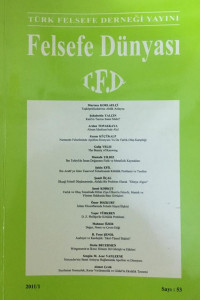Abstract
Felsefenin en çetin problemlerinden birini teşkil eden kötülük problemi,
düşünce tarihi boyunca pek çok düşünür ve filozofu meşgul etmiş, oldukça
dinamik ve işlevsel bir konudur. Tasavvuf felsefesinin büyük düşünürü İbn
Arabî’nin de bu konuyla yakından ilgilendiği ve bu mesele üzerinde kafa yorduğu
bilinmektedir. Dolayısıyla, onun düşünce sisteminde kötülük problemini
nasıl ele aldığını ve buna ilişkin nasıl bir teodise geliştirdiğini ortaya koymak
büyük bir önem taşımaktadır.
İbn Arabî’nin özgün bir teodise geliştirdiği, kötülük sorununa felsefi ve
tasavvufi açıdan önemli katkılarda bulunduğu söylenebilir. Bu katkılardan birisi,
Tanrı’nın “bilgelik” ve “hikmet”ine dayalı bir teodise önerisi, diğeri de, onun
sorunu irdelerken bir “üstdil” veya “paradoksal dil” geliştirmiş olmasıdır. Derin
bir tasavvufî ve felsefî içeriğe sahip olan bu dil, potansiyel/imkan olarak felsefe
yapmaya ve felsefi açıdan yeni ufuklar açmaya oldukça elverişli görünmektedir.
Keywords
References
- Affifi, Ebu’l-Âlâ, Tasavvuf Felsefesi, çev.: Mehmet Dağ, Kırkambar Yay., İstanbul 1998.
- ----------, Fusûsu’l Hikem Okumaları İçin Anahtar, çev.: Ekrem Demirli, İz Yay., İstanbul 2006.
- Aydın, Mehmet S., Din Felsefesi, Selçuk Yay., 3. bs., İzmir 1992.
- -----------, “Risale-i Nur’da Kötülük Problemi”, Köprü Dergisi, Sayı: 59–60, Yaz-Güz 1997.
- Cevizci, Ahmet, Felsefe sözlüğü, Paradigma Yay., İstanbul 2002.
- Chittick, William, Tasavvuf, çev.: Tutan Koç, İz Yay., 4. bs., İstanbul 2008.
- David, Hume, Dialogues Concerning Natural Religion, ed. N. K. Smith, Bobbs-Merrill, New York 1947.
- Evans, C. Stephen ve R. Zachary Mans, Din Felsefesi: İman Üzerine Rasyonel Düşünme, çev.: Ferhat Akdemir, Elis Yay., Ankara 2010.
- Fârâbî, “Felsefenin Temel Meseleleri”, İslam Filozoflarından Felsefe Metinleri, çev. Mahmut Kaya, Klasik Yay., İstanbul 2011.
- Flew, Antony, “Divine Omnipotence and Human Freedom”, New Essays in Philosophical Theology, ed. A. Few-A. Macintyre, SCM Press, London 1955.
- Gazali, İhya-u Ulûmi’d-Din, çev.: Ahmet Serdaroğlu, Bedir Yay., İstanbul 1975, IV.
- Konevî, Sadreddin, Vahdet-i Vücûd ve Esasları, çev.: Ekrem Demirli, İz Yay., 2. bs., İstanbul 2004.
- Hick, John, Evil and the God of Love, Macmillan, London 1985.
- İbn Arabî, Fütûhât-ı Mekkiyye, çev. Ekrem Demirli, Litera Yayıncılık, 2. bs., İstanbul 2006, I-II, VIII.
- ----------, Fusûsu’l Hikem, çev. Nuri Gençosman, M. E. B. Yay., 5. bs., İstanbul 1992.
- ----------, Fusûsu’l Hikem, çeviri ve şerh.: Ekrem Demirli, Kabalcı Yay., İstanbul 2006.
Abstract
The problem of evil, one of the crucial problems of philosophy, has extremely
obsessed many scholars and philosophers throughout history of thought.
Because of being is a dynamic and functional issue. Ibn Arabî, a great scholar of the Mystical
philosophy, is an important philosopher in this issue. Thus, it is significant
to indicate his method of analyzing the problem of evil in a theodicy
Ibn Arabî, philosophically and mystically presents an authentic theodise
that seriously contributes to the problem of evil. One of the contributions is
the theodise of God’s “wisdom” and “mystery” and the other is his usage of a
“paradoxal language”. His mystical and philosophical language is adequate to
philosophize and opens new paths of philosophical perspectives.
References
- Affifi, Ebu’l-Âlâ, Tasavvuf Felsefesi, çev.: Mehmet Dağ, Kırkambar Yay., İstanbul 1998.
- ----------, Fusûsu’l Hikem Okumaları İçin Anahtar, çev.: Ekrem Demirli, İz Yay., İstanbul 2006.
- Aydın, Mehmet S., Din Felsefesi, Selçuk Yay., 3. bs., İzmir 1992.
- -----------, “Risale-i Nur’da Kötülük Problemi”, Köprü Dergisi, Sayı: 59–60, Yaz-Güz 1997.
- Cevizci, Ahmet, Felsefe sözlüğü, Paradigma Yay., İstanbul 2002.
- Chittick, William, Tasavvuf, çev.: Tutan Koç, İz Yay., 4. bs., İstanbul 2008.
- David, Hume, Dialogues Concerning Natural Religion, ed. N. K. Smith, Bobbs-Merrill, New York 1947.
- Evans, C. Stephen ve R. Zachary Mans, Din Felsefesi: İman Üzerine Rasyonel Düşünme, çev.: Ferhat Akdemir, Elis Yay., Ankara 2010.
- Fârâbî, “Felsefenin Temel Meseleleri”, İslam Filozoflarından Felsefe Metinleri, çev. Mahmut Kaya, Klasik Yay., İstanbul 2011.
- Flew, Antony, “Divine Omnipotence and Human Freedom”, New Essays in Philosophical Theology, ed. A. Few-A. Macintyre, SCM Press, London 1955.
- Gazali, İhya-u Ulûmi’d-Din, çev.: Ahmet Serdaroğlu, Bedir Yay., İstanbul 1975, IV.
- Konevî, Sadreddin, Vahdet-i Vücûd ve Esasları, çev.: Ekrem Demirli, İz Yay., 2. bs., İstanbul 2004.
- Hick, John, Evil and the God of Love, Macmillan, London 1985.
- İbn Arabî, Fütûhât-ı Mekkiyye, çev. Ekrem Demirli, Litera Yayıncılık, 2. bs., İstanbul 2006, I-II, VIII.
- ----------, Fusûsu’l Hikem, çev. Nuri Gençosman, M. E. B. Yay., 5. bs., İstanbul 1992.
- ----------, Fusûsu’l Hikem, çeviri ve şerh.: Ekrem Demirli, Kabalcı Yay., İstanbul 2006.
Details
| Primary Language | Turkish |
|---|---|
| Subjects | Philosophy |
| Journal Section | Research Articles |
| Authors | |
| Publication Date | July 15, 2011 |
| Submission Date | May 1, 2011 |
| Published in Issue | Year 2011 Issue: 53 |

